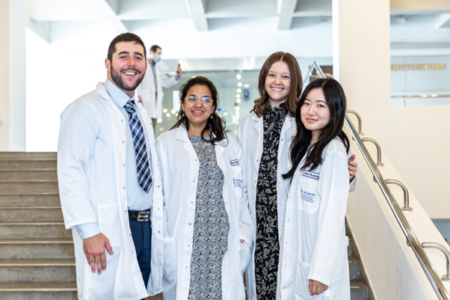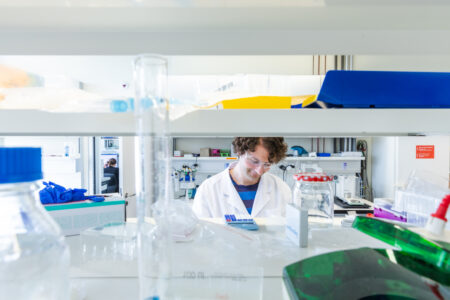
The World Health Organisation estimates a projected shortfall of 11 million health workers by 2030, mostly in low- and lower-middle income countries. Chronic diseases already account for 74% of global deaths. Nearly one in six people will be aged 60 or older by the end of the decade, placing unprecedented strain on health systems. Meanwhile, emerging threats — from new pandemics to antimicrobial resistance — continue to outpace our ability to respond.
In this high-stakes landscape, the world’s best medical schools are focusing less on producing doctors and more on training clinician-leaders who can shape policy, pioneer medical breakthroughs, and redefine standards of care.
In Singapore, researchers at Duke-NUS Medical School and the National Neuroscience Institute recently identified a previously missing gene responsible for frequent epileptic seizures in patients with Angelman Syndrome. Thanks to Johns Hopkins, predictive analytics developed for ICU settings are now helping hospitals around the world manage critical care more effectively. And in the UK, UCL Medical School continues to influence national health policy through its work on health equity and public health education.
These are the kinds of institutions that anticipate crises just as well as they respond to them — they’re also your best options for a world-class medical qualification.

Duke-NUS develops students from diverse academic experiences and vibrant backgrounds into outstanding and future-ready doctors. Source: Duke-NUS Medical School
Duke-NUS Medical School
Formed through a partnership between Duke University and the National University of Singapore (NUS), Duke-NUS Medical School is Singapore’s only graduate-entry medical school. It welcomes students with diverse academic qualifications — from bachelor’s degree to PhDs. So, whether your background is in science, engineering, humanities and arts, or business, what matters most is your pursuit of excellence in developing your profession as a doctor, your drive to lead change in addressing healthcare challenges and enhancing patient care.
Its world-class Doctor of Medicine (MD) programme is the ultimate launchpad for the next generation of clinicians. Modelled on the research-intensive curriculum of Duke University School of Medicine, this rigorous four-year course is designed to train outstanding doctors who demonstrate technical excellence and are prepared to lead the healthcare industry through innovation, research and education.
At Duke-NUS, learning how to question, investigate, and discover is just as critical as learning to diagnose. MD students engage in deep, sustained research through a dedicated Research and Scholarship phase in their third year, which provides valuable opportunities for them to deepen their understanding of human biology under the guidance of the world-renowned faculty — the same ones driving real-world breakthroughs to tackle pressing public health issues.
During the COVID-19 pandemic, Duke-NUS researchers were among the first globally to isolate and characterise SARS-CoV-2, spearheading diagnostics, vaccines, and therapeutics — including the world’s first FDA-approved neutralising antibody test kit. Duke-NUS scientists also developed ETC-159, Singapore’s first homegrown cancer drug and mapped stomach tumours to uncover new personalised treatment strategies. The School is also behind the ground-breaking discovery of the role of IL-11 in ageing and fibrotic diseases, paving the way for novel therapies that could promote healthier ageing.
These discoveries are made possible by the school’s partnership with SingHealth, Singapore’s largest public healthcare group. Together, they form the SingHealth Duke-NUS Academic Medical Centre — a powerful bench-to-bedside ecosystem that links scientific research directly to patient care.
Beyond the MD, Duke-NUS also offers a MD-PhD programme, ideal for aspiring clinician-scientists; three unique PhD programmes in Integrated Biology and Medicine, Clinical and Translational Sciences and Quantitative Biology and Medicine; as well as Master’s and Graduate Certificate programmes in areas ranging from translational medicine, innovation and patient safety to economic evaluation and leadership. All are flexible, enabling healthcare professionals to upskill, innovate or lead in improving healthcare.
Discover how far medicine can take you at Duke-NUS. Applications will be open soon.

Starting in Year One, you will train with top medical professionals in the clinical care environment. Source: The Johns Hopkins University School of Medicine
The Johns Hopkins University School of Medicine
What makes a medical school great? Rankings is one answer, and by that measure, the Johns Hopkins University School of Medicine stands out. It ranks #16 in World University Rankings 2025 by Times Higher Education and #4 for medicine according to QS World University Rankings by Subject 2025.
But what sets the school apart is the heart behind the rankings. Across 32 academic departments and institutes, it trains medical students to practise patient-centred care and drive progress in health care delivery.
This commitment comes to life through a wide range of academic programmes. For example, the MD/MBA dual degree combines the curriculum from School of Medicine with Carey Business School’s. Meanwhile, 24 biomedical graduate programmes and three combined degree options offer even more specialised paths.
The MD/PhD prepares you for academic medicine, biomedical science, and top-flight medical training. The MD/MS in Health Care Management trains leaders with the business skills to improve the quality and access to health care. And the MD/MPH degree provides a population-based lens to help you tackle complex public health challenges.
At the core of it all, however, is research. With support from over 2,000 NIH-funded faculty members and access to six research institutes, 710 labs and 120 core facilities, you get practical experience in various fields like cancer, genetics, and genome biology, all while building the skills to lead in tomorrow’s medical breakthroughs.

Medicine is a global field which is why UCL Medical School welcomes students from all around the world. Source: UCL Medical School
University College London Medical School
University College London (UCL) Medical School has been training doctors and scientists in London since 1834, and it continues to do so today as the #6 in the world for medicine. Situated in the heart of London, UCL Medical School has a prime location to host some of the brightest minds in basic and clinical medicine. They bring real-world insights into the school’s six-year undergraduate degree, flexible postgraduate programmes, and Continuing Professional Development (CPD) modules.
Lessons are also informed by discoveries made in the Research Department of Medical Education (RDME) — one of the UK’s top medical education research departments. Here, researchers from various fields including education, social science, psychology, philosophy, medical ethics, and clinical specialities come together to produce award-winning research. Complementing this rigorous academic environment is hands-on clinical experience. You can learn from leading doctors and work with real patients thanks to UCL’s partnerships with University College London Hospitals NHS Foundation Trust (UCLH), The Royal Free, The Eastman Dental Hospital, and the Francis Crick Institute.
This explains how alumni have become influential leaders in global medicine — from Presidents of the Royal College of Physicians and the Royal College of Surgeons to the Chair of the General Medical Council. It’s the kind of impact that only comes from a school deeply committed to excellence.
*Some of the institutions featured in this article are commercial partners of Study International










